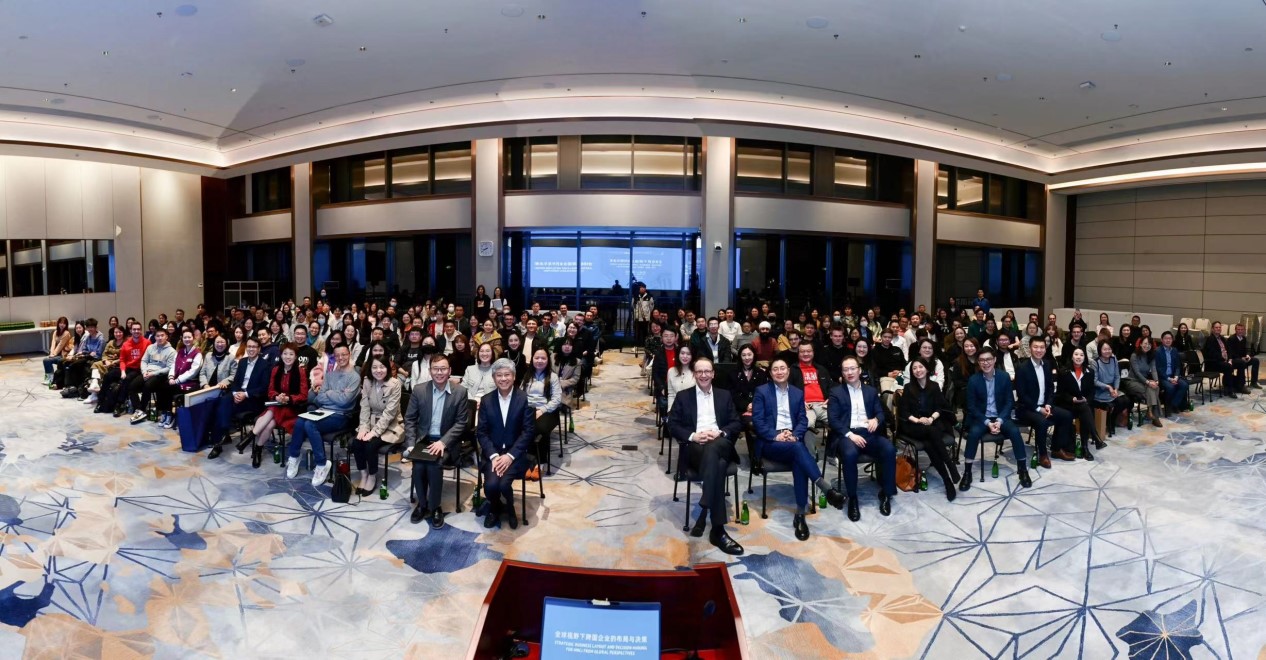Mark Schneider, CEO of Nestlé Group and member of the Advisory Board of Tsinghua University School of Economics and Management (Tsinghua SEM), visited the school to delivery his keynote speech titled "Strategic Business Layout and Decision Making for Multinational Corporations from Global Perspectives" on March 22, 2024. BAI Chong-En, dean of Tsinghua SEM, Mansfield Freeman Chair Professor, and executive dean of the Institute for Global Development at Tsinghua University, attended the event along with many others. The event was presided over by HE Ping, vice dean of the school.
In his speech, BAI introduced the longstanding cooperation and shared commitment to sustainable development between Tsinghua SEM and Nestlé. He expressed gratitude to Nestlé for providing students with learning opportunities derived from the world's best practices.

BAI Chong-En speaks at the event.

HE Ping presides over the event.
Schneider delved into his tenure as CEO of Nestlé Group, illustrating how the Nestlé brand has integrated into local cultures in 188 countries and regions worldwide. He further underscored and offered insights into Nestlé's strategies and practices in sustainable development.

Mark Schneider delivers his speech.
In his discussion of global strategic business layout and decision-making in multinational corporations, Schneider noted the challenges and opportunities brought by the changing global environmental. He said the world is facing a series of challenges, including geopolitical conflicts, global economic uncertainties, and environmental issues. In recent years, events such as the COVID-19 pandemic have highlighted the interdependence of nations in the era of globalization, which has exerted unexpected influence on the global supply chain. Despite these hurdles, Schneider stressed that globalization also presents significant opportunities for multinational corporations. The growing consumer demand for healthy and sustainable products is driving businesses to innovate and develop new offerings to meet these market needs.
Regarding product localization, Schneider highlighted Nestlé's experience in China, a rapidly developing major market. Within China, Nestlé partners with local suppliers to champion regenerative agricultural practices and foster local economic development. Concurrently, to better cater to the Chinese market, Nestlé has tailored its products to meet the tastes and health preferences of Chinese consumers. Schneider specifically mentioned that Nestlé allocates 1.7 billion Swiss Francs annually for research and development, aimed at fueling product innovation and enhancement. This investment is crucial for meeting consumers' demands for healthy, nutritious, and environment friendly products.
Following this, Schneider explained the pivotal role of sustainable development in Nestlé's overarching global strategy. Nestlé is steadfast in its commitment to mitigating climate change, with a target of net zero carbon emissions by 2050. To this end, Nestlé is actively engaged in reducing its environmental footprint by endorsing regenerative agriculture, reducing water consumption, and promoting a circular economy model. Nestlé vigorously pursues its global sustainability agenda within China, which includes reducing greenhouse gas emissions, advancing sustainable packaging initiatives, transitioning to renewable energy sources for production, and fully embedding sustainability into its brand strategy and consumer communication. Nestlé is dedicated to fulfilling its global sustainability commitments in the Chinese market through concrete actions, Schneider said.
Schneider emphasized that Nestlé's achievements in China are not only due to its products and strategies but also to its profound understanding and respect for Chinese culture. Nestlé places great importance on fostering long-term cooperation with China, solidifying its presence in the Chinese market through collaborative educational projects and social responsibility initiatives.
During the Q&A session, Schneider interacted with the audience to address topics including supply chain building, product sustainability transformation, global strategic adjustments, how multinational corporations attract and retain international talent, and perspectives on emerging markets.

The audience listens to Mark Schneider's lecture.

Students bring their questions to Mark Schneider.

Tsinghua SEM representatives and Mark Schneider’s delegation meet for talks.

Lecture participants pose for a group photo.
This event was sponsored by Tsinghua SEM and coordinated by the Institute for Global Development at Tsinghua University. The lecture drew and audience of more than 300 participants, including undergraduate, master's, doctoral, as well as MBA, EMBA, and executive education students from Tsinghua SEM. Faculty and students from schools and departments across Tsinghua University also attended the lecture.
 Latest News
Latest News